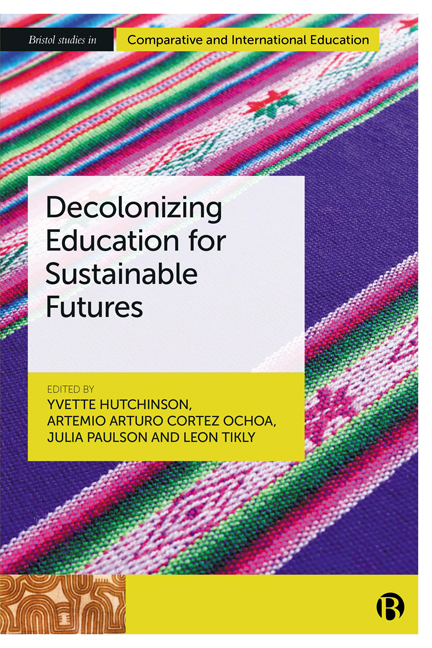Book contents
- Frontmatter
- Contents
- Series Editor Preface
- List of Figures and Table
- List of Abbreviations
- Notes on Contributors
- Acknowledgements
- Introduction
- PART I Connecting Decolonial and Sustainable Futures in Education
- PART II Decolonizing Education for Sustainable Futures: From Theory to Practice
- PART III Education’s Reparative Possibilities: Responsibilities and Reckonings for Sustainable Futures
- Conclusion
- Afterword
- Index
6 - Decolonizing the University: A Perspective from Bristol
Published online by Cambridge University Press: 18 January 2024
- Frontmatter
- Contents
- Series Editor Preface
- List of Figures and Table
- List of Abbreviations
- Notes on Contributors
- Acknowledgements
- Introduction
- PART I Connecting Decolonial and Sustainable Futures in Education
- PART II Decolonizing Education for Sustainable Futures: From Theory to Practice
- PART III Education’s Reparative Possibilities: Responsibilities and Reckonings for Sustainable Futures
- Conclusion
- Afterword
- Index
Summary
Introduction: decolonizing what?
Like many universities, the University of Bristol is engaged in a process of examining its complex links with a colonial past. The University's relationship with slavery, for example, is memorialized in the names of some of its buildings and facilities and it has benefited from investments derived from slave labour, such as tobacco, chocolate and sugar. The process of reckoning with the university's heritage involves a broad range of work that is being coordinated by a high-level strategic committee chaired by the provost.
Acknowledging past injustices and incorporating them into the story that universities tell of themselves makes a contribution towards reparative justice as argued by Walters (2017) in the context of Brown and Harvard universities. Indeed, as was the case with both of these US universities, research into the past and its legacy is one way to understand the structural injustices that persist into the current day and inform actions that might improve the lives of those who continue to be harmed as part of this legacy.
This pursuit of intergenerational equity is one of the features that brings decolonization into alliance with climate justice. Colonial injustice, like climate injustice, involves inequities that play out over many generations. In the case of climate, current extractive activities may impose significant costs on future generations. In the same way, colonial injustice persists through time because of its deep embedding within economic, educational and social institutions and within cultural norms and power relationships. Injustice, in other words, may be passed between generations even in the absence of any intentional activity unless it is explicitly identified, countered and dismantled. In both cases, of climate and colonial injustice, inequities can be obscured by the fact that oppressor and oppressed are not always contemporaneous.
This chapter concentrates on intergenerational manifestations of coloniality without wishing to hide contemporaneous injustice so as to limit the focus on a specific aspect of education, that is, what Pinar et al (1995) define as the culture-preserving aspects of curriculum over time. They write that an educational curriculum is ‘what the older generation chooses to tell the younger generation … [the curriculum] is intensely historical, political, racial, gendered, phenomenological, autobiographical, aesthetic, theological and international.
- Type
- Chapter
- Information
- Decolonizing Education for Sustainable Futures , pp. 119 - 135Publisher: Bristol University PressPrint publication year: 2023

